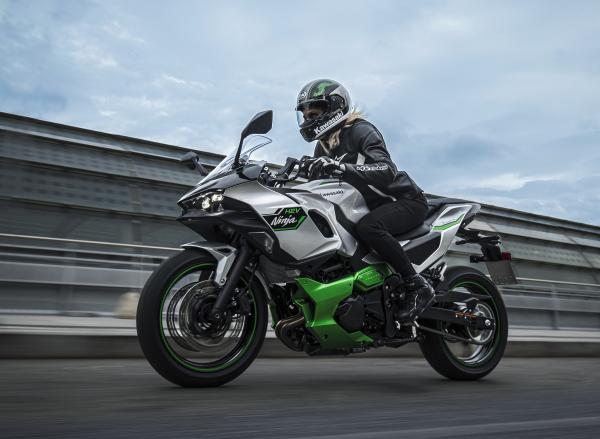
Kawasaki is blazing a trail when it comes to electrified motorbikes as far as major OEMs go. Having already launched a couple of fully electric bikes - the Ninja e-1 and Z e-1 - the Japanese manufacturer has now revealed its Ninja 7 Hybrid/HEV.
Kawasaki dubs it the “first mass-produced Strong Hybrid” motorbike (not counting scooters), and at its heart is nothing particularly special-sounding - a 451cc parallel twin. Everything else about the Hybrid is atypical, though.
First, there’s a transmission that allows for either automatic or manual gear selection, and then there’s the 48-volt battery that lives in the middle of the Hybrid’s trellis frame for optimal weight distribution. That powers a 12bhp traction motor, bringing the total output to 69bhp while the peak torque figure is 44.5lb ft.
That’s not far off what the larger CP2 engine in the Yamaha MT-07 offers, and indeed, Kawasaki pegs the as a “mid-size package” offering 650cc to 700cc equivalent performance, paired with a fuel consumption rate of four litres per 100km (in WMTC test conditions, equivalent to 70.5mpg) which, with a 14-litre tank, means the Ninja 7 Hybrid can carry enough fuel for up to 217 miles of riding.
All the while, Kawasaki says the Hybrid delivers “the instant acceleration to rival that of a 1,000cc-class supersport model from a standing start” when using the e-boost function. Sounds entertaining.
Exactly what the Ninja Hybrid is like to ride depends on which of the three modes are selected. Sport-Hybrid, Eco-Hybrid, or EV can be selected by the rider, with the latter restricting both speed and range - Kawasaki suggests that’s used “for certain situations where quiet riding is appropriate, such as in residential areas or in parking garages”.
The Eco-Hybrid mode improves the fuel economy compared to the above-mentioned WMTC figure, and the bike’s identity as a hybrid means that whenever the internal combustion engine is being used (in either Sport- or Eco-Hybrid mode), the 1.4kWh battery is being charged, reducing the frequency with which it is necessary to actively charge it. Using the Eco-Hybrid mode also means that the bike automatically turns the engine off when it comes to a stop.
The selected mode also affects shifting. The Ninja 7 Hybrid is fitted with an “automated manual transmission” - an electronically controlled six-speed box capable of full-automatic shifting. Selecting the ‘EV’ mode engages the full-auto shifts, while ‘Sport-Hybrid’ enables manual button-shift, and ‘Eco-Hybrid’ leaves the choice up to the rider between manual and automatic shifting. Whenever manual shifting is being used, the transmission will automatically select first gear whenever the bike comes to a stop.
There is also a ‘Walk Mode’ with a reverse function. Engaging this mode means that the bike will move forward at walking speed when the throttle is opened. When it is closed past the “zero point”, the bike will reverse.
The Ninja hybrid is half-fared with black, lime green and silver bodywork, and has an apparently “sporty riding position,” but it seems reasonably relaxed judging by the press photos. While we’re on the subject of the cockpit, there’s a 4.3-inch full-colour TFT (which hasn’t been shown just yet) featuring smartphone connectivity via a custom version of Kawasaki’s Rideology app.
Kawasaki Ninja Hybrid price and availability
The Kawasaki Ninja Hybrid will arrive in UK dealerships in April 2024. The price hasn’t yet been revealed, but we’d expect it to be more expensive than the average middleweight.
Additional reporting from Alex Whitworth

